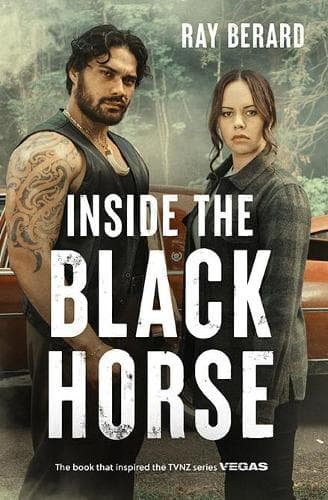Review: Inside the Black Horse
Reviewed by Greg Fleming
Originally self-published in 2015, this remarkable crime novel, which won the 2016 Ngaio Marsh best first novel award and was dubbed one of the best books of that year by the New Zealand Listener, gets a new edition thanks to a TVNZ tie-in with the six-part series Vegas - inspired by the book - hitting the screen this month.
After a hardscrabble upbringing in rural Quebec, Berard immigrated to New Zealand in 1994.
“Where I grew up, there were two ways to make big money: farming pigs for the corporate machine or running drugs over the border for the gangs. I lost friends to those gangs.”
It was a job as area manager for the TAB that gifted him the material for his debut novel. Part of the job entailed keeping a diary of events, and Berard soon found himself embellishing characters and situations. He saw it as, “a microcosm of the world. All these different cultures thrown together, all chasing lady luck.”
It was fortuitous because Berard was a late-starter to the writing game. He was 53 when Inside The Black Horse was finally released but that life experience and rare ability to take advice from those more experienced in the book world - editor Stephen Stratford, literary power-couple Chris and Barbara Else - elevated the final product to a deftly plotted and moving crime novel with a broad social focus.
From the opening pages, you feel you’re in the hands of a naturally gifted storyteller, one who captures the inner workings of characters with a few sentences, one able to navigate a fast-moving narrative with multiple threads. A growing love story between two characters takes some of the hard edges off the poverty and gang violence but throughout the characters - from all walks of life - feel real.
They have rough edges, obligations, troubled pasts, personal demons which Berard sprinkles with a touch of genre dust to keep the pages turning (note, this is not Once Were Warriors). Among them are the desperate, debt-ridden Pio who instigates more than he knows when he walks into a Rotorua bar with a gun; self-serving corporate bully Peter Butterworth; Black Horse bar owner Toni, a Māori widow who has had to put her emotional life on hold to feed her family; a lonely American insurance investigator who is called in to determine whether the hold-up (which nets the robber more than $115,000) was an inside job; and most memorably Kingi, the feared gang leader who we first meet sitting atop his ‘throne’ - “an old La-Z-Boy full of holes and covered with dirty brown stains.”
Kingi, too, has a cross to bear, namely a growing addiction to his own product - methamphetamine. He has already accidentally shot himself in the thigh while high and the weakness has attracted the attention of his eager-eyed underlings, anxious to move up the chain of command.
One can see why this fast-moving contemporary crime story with a side-serving of romance was picked up by TVNZ. It’s a story alive to the social and cultural inequalities rampant in Aotearoa’s would-be answer to Las Vegas - a town where the smart kids “piss off” to Aus or “end up slinging beer, cleaning hotel rooms or becoming a crim” - while never becoming a slave to any sort of social realist agenda.
Some characters suffer a more generalised malaise; Toni feels her life has been, “like the clock on the wall over her door. The time changed, the dials moved, but nothing else.” Corporate cowboy Butterworth, who may well be the scariest figure in the book, satiates his feelings with food.
But Berard also mixes in some lighter moments. At one point, two British cyclists lose their way in the bush and end up, unknowingly, at one of Kingi’s cook houses. Kingi - a muscled-up, tattooed Māori warrior (that’s him portrayed by actor Eds Eramiha on the cover) waits until they finish their impromptu tryst before politely informing them,“This, folks, is the other Aotearoa. The one they don’t put in the travel brochures.” The pair can’t get on their bikes fast enough.
Berard is busy working on his next novel The Diary of a Dead Man which he says will be, “a story of faith vs wealth played out in modern New Zealand,” but in the meantime, let’s hope this handsome new edition of Inside the Black Horse and the TV series bring wider readership to one of the best debut crime-writing outings of the last decade.
Reviewed by Greg Fleming
